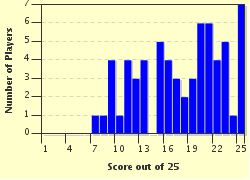Quiz Answer Key and Fun Facts
1. The letter 'A'; perhaps the most notorious thief in the Old Testament is the man who stole a number of valuable items in Canaan while the Israelites were preparing to drive out the inhabitants and assume possession of the Promised Land. Scripture reports the LORD turned against the Israelites due to the actions of the thief and Joshua experienced bitter defeat at Ai. What was the name of the thief, as per Joshua 7?
2. The letter 'B' is for 'Burn'. According to Joshua 11:6 and 9, what item of their adversaries did Joshua and the Israelites burn with fire?
3. The letter 'C'; out of eleven other spies sent into Canaan with Joshua, who was the only one to come back with a favorable report about the land? (Numbers 13:30)
4. The letter 'D' is for 'Deadly' as in a 'Deadly Storm'. According to Joshua 10:11 what type of a storm did God unleash on the enemies of Joshua and the Israelites at Gibeon, causing more deaths than those who were killed by "the children of Israel with the sword"?
5. The letter 'E' is for 'Eleazar' who played a prominent role in the life of Joshua. Who was he? (Numbers 32:28)
6. The letter 'F' is for 'Father'. Who was Joshua's father, as per Exodus 33:1?
7. The letter 'G' is for 'Gibeon'. According to Joshua 10:12, what miracle did God perform for Joshua and the Israelites at Gibeon?
8. The letter 'H'. According to Numbers 13:16, Joshua was not the original name of the man who led the Israelites into the Promised Land. He became known as Joshua after Moses gave him that name. What was Joshua's original name?
9. The letter 'I'. There's no doubt the overwhelming majority of the Israelites lacked faith and as a result they didn't want to cross the Jordan River to conquer the land of Canaan. However, with lack of faith aside, out of the four words below that start with the letter 'I', what one best describes the feelings of many of the Israelites as to why they did not want to follow Joshua's recommendation to cross the Jordan River to enter Canaan?
10. The letter 'J'. What was the name of the community Joshua and the Israelites marched around seven times and the walls came tumbling down? (Joshua 6)
11. The letter 'K' is for 'Kings'. Joshua 10:17 tells of five kings of Canaan found hiding at a particular location. Where did Joshua find the kings hiding?
12. The letter 'L'. Out of the four place-names below that start with the letter 'L', what was the name of the community in Canaan that Joshua and the Israelites conquered, as per Joshua 10:29?
13. The letter 'M'. Who did Joshua replace as the leader of the Israelites, giving him the responsibility of leading them into the Promised Land? [Joshua 1:4]
14. The letter 'N' is for 'New Testament'. Using the New King James Version Bible, is Joshua mentioned by name in the New Testament?
15. The letter 'O' is for 'Old'. According to Joshua 24:29, how old was Joshua when he died?
16. The letter 'P' is for 'Peace'. What is the name of the only group of people who lived in the land of Canaan who made peace with Joshua and the Israelites? (Joshua 11:19)
17. The letter 'Q' is for 'Quash'. While in Canaan, Joshua had to quash a number of rebellions against his leadership, similar to what Moses experienced when the Israelites were wandering in the wilderness.
18. The letter 'R'. What was the name of the prostitute whose life, and the lives of her family, were spared when the Israelites conquered Jericho? (Joshua 6:23)
19. The letter 'S' is for 'Spies'. Moses sent spies into Canaan, as per Numbers 14. Did Joshua also send out spies?
20. The letter 'T' is for 'Twelve' as in 'Twelve Stones'. What is the significance of twelve stones in Joshua's life? (Joshua 4:1-24)
21. The letter 'U' is for 'Utterly' as in 'Utterly Destroy'. When the Israelites entered Canaan, why did they "utterly destroy" a number of communities, killing everyone?
22. The letter 'V' is for 'Victory'. The book of Joshua tells of a number of spectacular victories by the Israelites led by Joshua. However, after Joshua's death, there were still a number of battles to be fought against the Canaanites to acquire their full allotment of the Promised Land.
23. The letter 'W' is for 'Water'. What body of water was parted for Joshua by the LORD? (Numbers 32:14-17)
24. The letters 'X' and 'Y' are for 'Yearning'. In a number of places in Exodus, it tells of the Israelites becoming rebellious against Moses and yearning to be back in Egypt. Much the same thing happened to Joshua as when the Israelites entered Canaan, there was a yearning to be back in Egypt.
25. The letter 'Z' is for 'Zebulun'. When the Israelites conquered Canaan and tracts of land were divvied up to the twelve tribes, it was done in alphabetical order with the people of Zebulun being last. (Joshua 19:10)
Source: Author
Cowrofl
This quiz was reviewed by FunTrivia editor
MotherGoose before going online.
Any errors found in FunTrivia content are routinely corrected through our feedback system.

